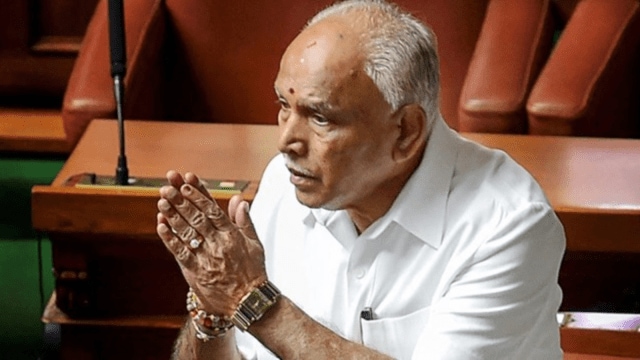Yediyurappa moves Supreme Court over HC order allowing Pocso case to proceed
On November 13, the Karnataka High Court had upheld a February 28 special court decision to take cognisance of a chargesheet filed by the CID against B S Yediyurappa and others.
 The special court had issued a summons to Yediyurappa and three others on November 18 to appear on December 2 to facilitate the start of the trial in the Pocso case, registered by the Bengaluru police in 2024. (File)
The special court had issued a summons to Yediyurappa and three others on November 18 to appear on December 2 to facilitate the start of the trial in the Pocso case, registered by the Bengaluru police in 2024. (File)Former Karnataka chief minister B S Yediyurappa has moved the Supreme Court against a November 13 Karnataka High Court order that allowed a Protection of Children from Sexual Offences (Pocso) Act case against him to proceed to the trial stage, by upholding the cognisance taken by a special court handling such matters.
The special court had issued a summons to Yediyurappa and three others on November 18 to appear on December 2 to facilitate the start of the trial in the Pocso case, registered by the Bengaluru police in 2024.
While the BJP leader moved the Supreme Court on Monday through a special leave petition on the criminal side, the Supreme Court is yet to list the plea for hearing, in which the CID unit of the Karnataka Police and the Bengaluru police are respondents.
The development came in the wake of the Karnataka High Court’s decision on November 13 to uphold the February 28 special court decision to take cognisance of a chargesheet filed by the CID unit of against Yediyurappa and others under Section 8 (sexual assault) of the Pocso Act, and sections 354 A (sexual harassment), sections 204 (destruction of document to prevent its production as evidence) and 214 (offering gift or restoration of property in consideration of screening offender) of the Indian Penal Code.
The summons was issued on November 18 after the special public prosecutor cited the November 13 order and sought advancement of a hearing that was previously posted for December 15.
“As already stated, the Hon’ble High Court of Karnataka confirmed the order of taking cognisance and issuing of summons to accused No.1 to 4. Further, as per Section 35 of the Pocso Act, the evidence of a child shall be recorded within a period of 30 days of taking cognisance, hence the court can proceed with the matter and issue an order for early appearance of accused persons,” the special court observed on November 18.
From March 2024, the case against Yediyurappa
Last year, on March 14, the Bengaluru police filed a First Information Report against Yediyurappa based on a complaint by the mother of a teenager alleging that her daughter had been subjected to a sexual assault by the former chief minister during a visit to his house on February 2.
On June 27, the CID unit filed a chargesheet against Yediyurappa and three others—Rudresh M, Arun Y M and Mariswamy G—who are his close associates and accused of collaborating with him to delete video recordings and pictures of a confrontation the victim had at his home after the alleged incident and also attempting pay money to the victim’s mother to keep quiet.
The victim’s mother, who was battling cancer, passed away shortly after the case was filed.
On July 4, 2024, the special court took cognisance of the CID chargesheet. Yediyurappa challenged this, and the high court referred the matter back to the special court on February 7, 2025, for fresh initiation of the cognisance process for the chargesheet.
On February 28 this year, the special court took fresh cognisance of the case and summoned Yediyurappa to appear on March 15. He challenged this again in the Karnataka High Court.
On November 13, a single-judge bench of the high court upheld the cognisance taken on February 28 and said the special court had followed due process. The order of the special court of “taking cognisance and issuing summons to the accused under the various provisions of the Indian Penal Code, 1860 and the Protection of Children from Sexual Offences Act, 2012, is upheld,” the high court ruled.
The high court, however, stated that “the trial court shall not insist upon the presence of accused No.1 (Yediyurappa) unless it is necessary during the course of the trial and will entertain the exemption application filed on behalf of accused No.1, unless his presence is essential”.
The summons issued by the special court for appearance on December 2 will require Yediyurappa to appear in the Pocso court on the date indicated unless a higher court stays the summons. Yediyurappa has protection against arrest in the form of an anticipatory bail given by the high court on February 7 while returning the case to the Pocso court.
The cognisance of the chargesheet taken by the special court now sets the stage for the start of the trial in the case after Yediyurappa’s appearance in court.
Under Section 35 of the Pocso Act, the evidence of a victim should be recorded within 30 days of taking cognisance of a case, and the trial must be completed within a year from the date of taking cognisance of a case.







